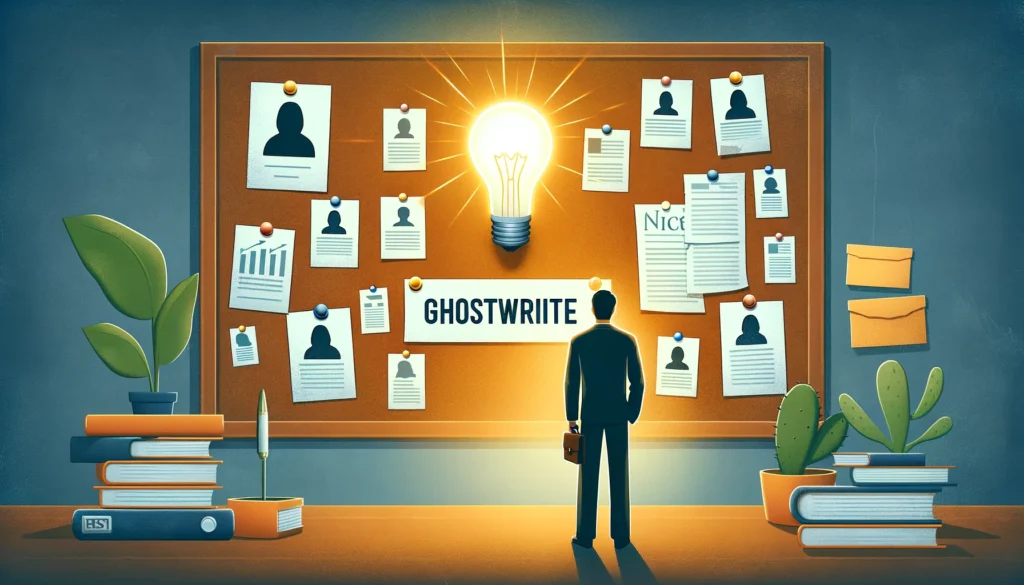Do you have a talent for writing, and want to earn from it? That’s exactly what you can do when you decide to become a ghostwriter. It’s a unique and rewarding path where your talent brings others’ stories and ideas to life, all while staying behind the scenes.
Ghostwriting is about versatility, adaptability, and the ability to capture various voices and styles, while turning someone else’s dreams into reality. Whether it’s penning books, articles, or speeches, the work is as diverse as it is fascinating.
For those with a passion for writing but looking for a different way to apply their skills, ghostwriting offers creativity, discretion, and, above all, a deep understanding of your craft. Let’s dive into what it takes to start this journey and thrive as a ghostwriter.
How to Become a Ghostwriter

Becoming a ghostwriter takes much more than just having a talent for writing.
To be successful at this job, you need to first really understand what it is, then find your niche and market it, but you can’t market your skills without a portfolio, so you need to do that too, and so on.
Here are the steps that you need to take to become a successful ghostwriter.
1. Understand the Role
Understanding the role of a ghostwriter is crucial if you’re considering this path. Essentially, a ghostwriter is someone hired to write content that is officially credited to another person.
The range of content a ghostwriter might create is vast, including books (both fiction and non-fiction), articles, speeches, blog posts, and even social media content.
From penning memoirs for celebrities to crafting thought leadership articles for business executives, the work can vary greatly in scope and subject matter.
One of the core aspects of being a ghostwriter is the need to remain anonymous. This means that, despite your hard work, creativity, and sometimes even your voice shaping the piece, the credit goes to the person who hired you.
This anonymity is not about being invisible; it’s about being a chameleon who can adapt to various writing styles and voices. It’s a unique skill set that allows the ghostwriter to step into the shoes of their client, understanding their perspective, tone, and voice deeply enough to write as if they were them.
The importance of remaining anonymous goes beyond just the contractual agreement between the ghostwriter and the client. It’s about trust and the ability to let someone else’s ideas, stories, and knowledge shine through your words.
For many writers, this aspect of ghostwriting is both a challenge and a reward, providing an opportunity to explore a wide range of topics and writing styles while helping others achieve their literary goals.
2. Build Your Skills

Building your skills is a fundamental step in becoming a successful ghostwriter. At the heart of ghostwriting are two essential abilities: excellent writing and robust research skills.
These form the foundation of your craft, enabling you to produce content that resonates with readers and accurately reflects your client’s voice and objectives.
Writing Skills
To excel as a ghostwriter, you need to be able to write clearly, compellingly, and grammatically correct. Your writing should be adaptable, allowing you to match the tone, style, and voice of your clients.
Now, improving your writing skills is a continuous process. Regular practice is key — write daily, if possible. Experiment with different styles and genres to expand your versatility.
Reading widely can also significantly improve your understanding of various writing techniques and voices.
Additionally, consider taking writing workshops or courses to refine your craft and receive feedback from other writers.
Research Skills
Ghostwriting often requires extensive research to ensure accuracy, authenticity, and depth in your writing, especially if you’re dealing with complex topics or creating content for a niche audience.
To strengthen your research skills, familiarize yourself with reliable sources of information for different fields. Learn how to efficiently sift through large amounts of data to find relevant facts and figures.
Online courses on research methodologies can also be beneficial, as can practicing writing on topics outside your comfort zone to hone your ability to quickly get up to speed on new subjects.
Improvement in these areas is not just about better writing or more effective research; it’s about building confidence in your ability to tackle a wide range of projects.
Feedback is also crucial — seek it out from clients and peers, and use it constructively.
Remember, the goal is to become a ghostwriter who can confidently complete any writing assignment, armed with a sharp pen (or a crisp keyboard) and a keen eye for detail.
3. Create a Portfolio
Creating a portfolio as a ghostwriter presents unique challenges, especially due to the confidentiality agreements that often prevent you from sharing the specific works you’ve penned for clients.
Despite this, a well-crafted portfolio is essential for demonstrating your writing skills to potential clients.
Here are some strategies to build a portfolio that showcases your ghostwriting skills:
- Use Anonymous Samples: If you’ve produced work that’s covered by a non-disclosure agreement (NDA), you can still create anonymized samples. This means removing any specific details that might reveal the client or the project and instead focusing on the writing itself. Make sure to get your client’s approval before using even anonymized content.
- Create Original Samples: If NDAs limit your ability to share past work, consider writing new pieces specifically for your portfolio. Choose topics you’ve written about as a ghostwriter and produce similar content that reflects your ability to write in different styles and voices. This approach not only showcases your versatility but also ensures that your portfolio is free from confidentiality concerns.
- Write Case Studies: While you might not be able to share the work itself, you can describe the projects you’ve worked on in the form of case studies. Discuss the client’s brief, your approach to the project, the challenges you faced, and the outcomes (without revealing confidential or identifying information). This method demonstrates your problem-solving skills and your ability to meet clients’ needs.
- Include Testimonials: With your clients’ permission, include testimonials in your portfolio. Even if the clients prefer to remain anonymous, their feedback can still highlight your professionalism, skill, and the quality of your work. Testimonials provide potential clients with insights into what it’s like to work with you, adding credibility to your portfolio.
- Showcase Your Range: Make sure your portfolio reflects the breadth of your ghostwriting capabilities. Include a variety of writing styles and formats, such as excerpts from longer texts (e.g., books or reports), blog posts, speeches, and any other content types you specialize in. This diversity will illustrate your ability to adapt to different writing needs and audiences.
Building a portfolio as a ghostwriter is about demonstrating your expertise and flexibility without breaching confidentiality. By using these strategies, you can create a compelling showcase of your skills that respects the privacy of your clients while still attracting new ones.
4. Find Your Niche

Finding your niche as a ghostwriter can significantly enhance your career by positioning you as an expert in a specific genre or industry. Specializing allows you to deepen your knowledge and skills in a particular area, making your services more attractive to clients looking for expertise in that field.
Here are some benefits of finding your niche and tips on how to choose one:
Benefits of Specializing
- Increased Demand: By specializing, you become the go-to person for clients in your niche, which can lead to more consistent work and higher pay. Clients are often willing to pay a premium for ghostwriters who have a proven track record and deep understanding of their specific needs.
- Efficiency: When you focus on a particular genre or industry, you become more efficient in your research and writing. This efficiency can lead to faster turnaround times for projects and the ability to take on more work without compromising quality.
- Enhanced Expertise: Specializing allows you to deepen your knowledge in a specific area, making it easier to produce high-quality content that resonates with the target audience. This expertise can also lead to opportunities for speaking engagements, workshops, or consulting roles within your niche.
How to Choose Your Niche
- Assess Your Interests and Strengths: Consider what subjects you’re passionate about and where your writing strengths lie. Your niche should be an area you enjoy and are confident writing about, as this will reflect in the quality of your work.
- Research Market Demand: Look into industries or genres that have a strong need for ghostwriters. Areas with a high volume of content production, such as business leadership, health and wellness, or technology, may offer more opportunities.
- Evaluate Your Experience: Your professional background and personal experiences can also guide you toward your niche. For example, if you have a history in finance, you might specialize in writing for financial publications or creating content for financial professionals.
- Consider Long-Term Viability: Choose a niche with enduring demand. While it’s tempting to jump on trends, a niche that has a consistent need for content will provide more stable opportunities over time.
- Start Broad, Then Narrow Down: If you’re unsure where to specialize, start by accepting a wide range of projects to discover what you enjoy and where your strengths are most pronounced. Over time, you can narrow your focus to the area that best matches your interests and market demand.
5. Network and Market Yourself
First up, professional networking sites like LinkedIn are a goldmine.
You want your profile there to show off what you’re great at and the kind of ghostwriting magic you can do. Keep your profile polished and post updates or articles that show you know your stuff. It’s also a good place to reach out to potential clients, like authors or business leaders who might need your skills.
Then, there are writing groups and forums. Sites like Reddit or even specific writing forums can be great spots to share your experiences and meet people who might need a ghostwriter. Just by being helpful and sharing what you know, you can make connections that might lead to work.
Content platforms, like Medium, can also be your stage. Here, you can publish articles or pieces that showcase your writing style and expertise. It’s a bit like leaving your book open on a table for people to read. Interested folks — potential clients, in other words — can stumble upon your work, love your style, and decide they want to work with you.
Then, you can create a profile on sites like UpWork or Fiverr to make it easier for clients to find you.
Also, Wattpad can be a good platform for you to show your writing skills. You can write anything you like and post it there, and someone might just see and like your writing style, and even contact and hire you.
Lastly, don’t forget the power of good old word-of-mouth. Happy clients will talk, and their recommendations can open doors to new projects. So, always aim to leave a good impression.
In all of this, the key is to be genuine and active. The more you engage with these communities and platforms, the more you’ll get out of them.
6. Set Your Rates

Setting your rates as a ghostwriter can feel like walking a tightrope. You want to price your services competitively but also fairly to reflect the value of your work and expertise. Here’s how you can strike the right balance:
- Know Your Worth: Start by understanding the value you bring to the table. This isn’t just about your writing skills but also your ability to research, adapt to different voices, and work discreetly. Your experience, niche expertise, and the complexity of the projects you can handle should all factor into your rates.
- Research the Market: Take a look at what other ghostwriters in your field are charging. This will give you a ballpark figure to start with. Remember, rates can vary widely based on factors like industry, project length, and the writer’s experience. Websites for freelancers, professional writing associations, and networking groups can be good places to find this information.
- Consider Your Costs: Running any freelance business comes with costs, from software subscriptions to taxes and health insurance. Make sure your rates cover these expenses plus your desired salary. This approach ensures you’re not just breaking even but actually making a living.
- Be Flexible: Having a standard rate is important, but being flexible based on the project’s scope, duration, and the client’s budget can help you secure more work. Some projects might be more straightforward, while others could require extensive research or interviews, so adjust your rates accordingly.
- Communicate Value: When discussing rates with potential clients, focus on the value you bring to their project. Explain the process, the time investment, and the skill set you offer. Clients are more likely to accept higher rates if they understand what they’re getting for their money.
- Set Clear Terms: Decide whether you’ll charge by the word, by the hour, or a flat fee per project. Flat fees are common for large projects like books, while hourly or per-word rates might be more suitable for articles or shorter content. Whatever you choose, make sure the terms are clear from the start to avoid misunderstandings.
Remember, setting your rates is an ongoing process. As you gain more experience and build your portfolio, you’ll be in a better position to command higher fees. Start with a rate that feels right, provides value to your clients, and compensates you fairly for your time and expertise.
Over time, you’ll find the sweet spot where your clients feel they’re getting great value, and you’re being paid what you’re worth.
Understand the Business Side

Understanding the business side of ghostwriting is just as crucial as honing your writing skills. Let’s break it down into three key areas: contracts, time management, and client relationships.
First off, contracts are your safety net. They’re not just formalities; they’re what protect you and your client by clearly laying out expectations, deadlines, rates, and rights.
A good contract ensures everyone’s on the same page from the get-go, helping to avoid any misunderstandings down the line. Think of it as setting the rules of the game before it starts.
Time management, on the other hand, is all about keeping the show running smoothly. Ghostwriting projects, especially big ones like books, can be marathons. Without good time management, you could easily burn out or miss deadlines.
It’s about finding a rhythm that works for you and the project, breaking the work down into manageable chunks, and keeping a steady pace. This way, you keep stress levels down and productivity up.
Lastly, maintaining a good relationship with your clients is the golden key to a successful ghostwriting career. This goes beyond just delivering quality work. It’s about communication, understanding their vision, and being adaptable to feedback.
Happy clients lead to repeat business and referrals, which are worth their weight in gold in this industry. A positive, professional relationship can turn a one-time project into a long-term partnership.
So, while the creative side of ghostwriting is where the magic happens, the business side is what keeps the lights on and the work flowing in. Mastering both is the secret to building a fulfilling and sustainable career as a ghostwriter.
Conclusion
Learning how to become a ghostwriter can bring you a lot of rewards. It opens up a world where your words bring others’ stories, ideas, and visions to life, all while challenging you to grow and adapt as a writer. This path offers the unique satisfaction of seeing your work impact readers, even if your name isn’t on the cover.
As you step into the world of ghostwriting, remember that success comes from understanding your role, honing your skills, building a robust portfolio, and navigating the business aspects with savvy. With dedication and the right approach, you’ll find that ghostwriting is not just a job, but a fulfilling career that celebrates your passion for writing and storytelling.
FAQ
How much do ghostwriters make?
Ghostwriters’ earnings vary widely based on experience, niche, and the complexity of the projects they undertake. While beginners might start with lower rates, experienced ghostwriters can earn significantly more, with some making upwards of $30,000 to $100,000 or more per book project. Factors like the client’s budget, the length of the manuscript, and the ghostwriter’s reputation play crucial roles in determining compensation.
Why is ghostwriting illegal?
Ghostwriting is not illegal. It’s a legitimate service where a writer produces work for another person who is then credited as the author. Ethical concerns arise if the work involves academic papers or when not disclosed appropriately in certain fields, but in the realm of books, speeches, and content creation, it’s a widely accepted and legal practice.
How do I start ghostwriting with no experience?
Starting ghostwriting with no experience involves building a writing portfolio with samples of your work, even if they’re personal projects or contributions to blogs and websites. Networking, joining writing groups, and leveraging platforms like LinkedIn can help you connect with potential clients. Offering your services at a competitive rate initially can also open doors to opportunities and help you gain valuable experience.
Is ghost writing profitable?
Ghostwriting can be quite profitable, especially as you gain experience and establish a niche. The key to profitability lies in building a strong portfolio, networking effectively, and delivering high-quality work that meets clients’ needs. Experienced ghostwriters can command high fees for their services, making it a lucrative career option for skilled writers.
Can a ghostwriter steal your story?
When working with a reputable ghostwriter, the risk of them stealing your story is minimal. Professional ghostwriters adhere to ethical standards and contractual agreements that protect both the writer and the client’s rights. Choosing a ghostwriter with a good track record and clear contracts can help ensure your story remains safe.
Can anyone be a ghostwriter?
While theoretically, anyone with good writing skills can attempt ghostwriting, success in the field requires more than just the ability to write well. It demands versatility, the capacity to adopt various writing styles and voices, strong research skills, and the ability to work closely with clients to bring their vision to life. Building a career as a ghostwriter also involves understanding the business side, including marketing oneself and managing client relationships effectively.
